#Susan faludi
Text
The more women are paid, the less eager they are to marry. A 1982 study of three thousand singles found that women earning high incomes are almost twice as likely to want to remain unwed as women earning low incomes. "What is going to happen to marriage and childbearing in a society where women really have equality?" Princeton demographer Charles Westoff wondered in the Wall Street Journal in 1986. "The more economically independent women are, the less attractive marriage becomes."
Men in the '80s, on the other hand, were a little more anxious to marry than the press accounts let on. Single men far outnumbered women in dating services, matchmaking clubs, and the personals columns, all of which enjoyed explosive growth in the decade. In the mid-80s, video dating services were complaining of a three-to-one male-to-female sex ratio in their membership rolls. In fact, it had become common practice for dating services to admit single women at heavily reduced rates, even free memberships, in hopes of remedying the imbalance.
Personal ads were similarly lopsided. In an analysis of 1,200 ads in 1988, sociologist Theresa Montini found that most were placed by thirty-five-year-old heterosexual men and the vast majority "wanted a long-term relationship." Dating service directors reported that the majority of men they counseled were seeking spouses, not dates. When Great Expectations, the nation's largest dating service, surveyed its members in 1988, it found that 93 percent of the men wanted, within one year, to have either "a commitment with one person" or marriage. Only 7 percent of the men said they were seeking "lots of dates with different people." Asked to describe "what concerns you the day after you had sex with a new partner," only 9 percent of the men checked "Was I good?" while 42 percent said they were wondering whether it could lead to a "committed relationship."
These men had good cause to pursue nuptials; if there's one pattern that psychological studies have established, it's that the institution of marriage has an overwhelmingly salutary effect on men's mental health. "Being married," the prominent government demographer Paul Glick once estimated, "is about twice as advantageous to men as to women in terms of continued survival." Or, as family sociologist Jessie Bernard wrote in 1972:
“There are few findings more consistent, less equivocal, [and] more convincing, than the sometimes spectacular and always impressive superiority on almost every index—demographic, psychological, or social—of married over never-married men. Despite all the jokes about marriage in which men indulge, all the complaints they lodge against it, it is one of the greatest boons of their sex.”
Bernard's observation still applies. As Ronald C. Kessler, who tracks changes in men's mental health at the University of Michigan's Institute for Social Research, says: "All this business about how hard it is to be a single woman doesn't make much sense when you look at what's really going on. It's single men who have the worst of it. When men marry, their mental health massively increases."
The mental health data, chronicled in dozens of studies that have looked at marital differences in the last forty years, are consistent and overwhelming: The suicide rate of single men is twice as high as that of married men. Single men suffer from nearly twice as many severe neurotic symptoms and are far more susceptible to nervous breakdowns, depression, even nightmares. And despite the all-American image of the carefree single cowboy, in reality bachelors are far more likely to be morose, passive, and phobic than married men.
When contrasted with single women, unwed men fared no better in mental health studies. Single men suffer from twice as many mental health impairments as single women; they are more depressed, more passive, more likely to experience nervous breakdowns and all the designated symptoms of psychological distress—from fainting to insomnia. In one study, one third of the single men scored high for severe neurotic symptoms; only 4 percent of the single women did.
-Susan Faludi, Backlash: the Undeclared War Against American Women
430 notes
·
View notes
Text
Hearing other women talk vaguely about how things “used to be bad for women” saddens me. Things were really bad for women in [INSERT TIME PERIOD HERE]. (Not now though.) There’s always a sense of distance and indifference. An impersonality, an underlying sigh of relief, “Not that bad, could be worse.” I think this is a result of disconnection from each other and our histories. And I don’t think it’s totally our faults.
In my experience going to school in the USAmerican Midwest, I was taught the barest bones of women’s history. It was totally impersonal, cold, not engaging for me at all. We pretty much solely focused on legislature, and that did not thrill me. (Did you know Jane Addams had intimate relationships with women?) But then I started doing “independent study” (reading lesbian feminist writing) once I graduated high school and it was like my brain was exploding. I’m reading The Dialectic of Sex and I still feel that way. I just can’t get enough.
As a result of reading what I’ve read, I feel a stronger connection with women who are different from me because it turns out we have a lot in common. I feel less inclined to say things like “Women had it bad back in the day, but things are better now,” because I know not that much has actually changed, and the concrete changes that have been made are new and fragile. (Women in America only had a constitutional right to abortion for fifty years.)
I think if more women read books like Backlash by Susan Faludi, Loving to Survive by Dee LR Graham, and A Passion for Friends by Janice Raymond, we will have a wider perspective and a better shared understanding of our situation and position in our societies. I also think a lot of women would feel less crazy and alone upon reading women’s accounts of our own lives, what we synthesize from our experiences and observations, and how we can do things differently. That’s the effect feminist work had (and continues to have) on me.
You likely won’t find these books at a bookstore—at least that’s the case where I live—but you can find them online. I use ThriftBooks and Better World Books, and I’ve never received a damaged or illegible copy of a single book I’ve ever ordered, even though they’re super cheap, usually under $10 for a book. (They sometimes have highlighter marks or notes written in the margins, but I like seeing what the previous owner had to say, and I like to write in them too.) Finding and reading these books is well worth the effort. Talking about them and sharing them with other women is well worth the effort, too. I’d like to encourage every woman to get in touch with her intellectual legacy.
#mine#feminism#feminist#radical feminism#lesbian feminism#shulamith firestone#dee lr graham#janice raymond#susan faludi#booklr#bookblr
238 notes
·
View notes
Text
Currently reading Susan Faludi's Backlash. To put it mildly, I'm not appreciating Xadhoom's storyarc more.
I'm 100% aware that the way it looks informed by the backlash isn't intentional, but some tropes are definitely problematic.
(I'm tempted to write an article on it)


#xadhoom#susan faludi#backlash#disney#comics#disney comics#pk#duck avenger#fumetti#donald duck#pkna#paperinik#paperino
9 notes
·
View notes
Text
When reading Susan Faludi's Backlash, which you all should do, there was a rerelease a few years ago and it's important to note how nothing has changed since the original release in 1991, ...
Anyway, when reading the hollywood and tv section of this book, there are multiple mentions of a tv executive by the name of Shapiro. That's not too rare of a name and there's a lot of Shapiros in the US, but I can't help but wonder if that Shapiro is Ben Shapiro mother. Ben Shapiro, the founder of the Daily Wire, terrible debater, worse journalist, wrong opinion haver, harbinger of the current fascist movement in the US and inspiration for multiple mass shooters. We know he wanted to be a screenwriter, we know his mother was a tv executive.
Just a thought.
And it will never not be funny that between all the far right assholes who wanted to work in the arts, Ben kinda failed the hardest since he couldn't even make it with nepotism.
2 notes
·
View notes
Text
I’m reading “Backlash” by Susan Faludi right now and as someone who was just a little kid at the time, I had no idea how dystopian things were getting for women in the late 80s and early 90s. The Handmaid’s Tale was literally this close to becoming reality, jfc.
6 notes
·
View notes
Link
2 notes
·
View notes
Text
In 1986, U.S. apparel manufacturers cut their annual production of women’s suits by 40 percent; the following year, production dropped by another 40 percent. Several large suit manufacturers shut down their women’s lines altogether. The sudden cutback wasn’t inspired by a lack of demand: in 1986, women’s purchases of suits and blazers jumped 5.3 percent. And this reduction wasn’t gender-blind. In the same two years, output of men’s suits stayed the same.
Soon, department stores phased out the executive-dressing wings that they had opened for professional women in the late 1970s. Marshall’s shut down its Careers department; Carson Pirie Scott closed its Corporate Level division for women; Neiman Marcus removed all coordinated women’s business suits from many of its stores. Paul Harris Stores switched from women’s career clothes to miniskirts (and promptly lost $5.6 million). And Alcott & Andrews, the store that billed itself as a female Brooks Brothers when it opened in 1984, began stocking ruffled dresses. When Molloy toured its New York store in 1987, he couldn’t find a single suit. (Two years later, Alcott & Andrews went bankrupt.)
Susan Faludi, Backlash: The Undeclared War against Women
3 notes
·
View notes
Text
Susan Faludi: “How did modern feminism lose Roe v. Wade? An answer lies in Depp v. Heard.”
Pop culture and politics made feminism part of celebrity culture and corporate branding, leaving behind the poor and disenfranchised women who bear the real brunt of sexism and abortion bans.
#Susan Faludi#feminism#abortion#women’s rights#women#roe v. wade#Amber Heard#Johnny Depp#Depp vs. Heard#Roe v. Wade
3 notes
·
View notes
Text
But disillusionment is a start. Being disappointed is not the same as being defeated. The very fact that women feel cheated, the very fact that, when we survey the perfumed trappings of our world, we smell, however faintly, a rat, suggests that women are still in fighting form. We aren't yet down for the count. The right-wing forces understand this fact better than we do. Which is why the right elevated women in their ranks in the first place--to oppose a threat they take very seriously, the threat posed by the larger goals of feminism. Conservative politicians no longer bother to defend the old antifeminist Maginot line; they aren't trying to block women from universities, corporations, lines of credit, or representation on the Republican platform committee. They have ceded that territory. And in ceding it, in accepting women into formerly forbidden precincts, they have revealed that those precincts were only frontier outposts, not the innermost fortress, the citadel that holds the key to the patriarchal status quo. That status quo would keep women, no matter how many stock options or credit cards or congressional seats or board appointments they possess, in a political stalemate: We will accept you into our world as long as you agree to accept the world as it is. The opponents of women's liberation are girding for the next assault by American women. They seem to believe it will be an assault on the world as it is. We can only hope they are right.
Susan Faludi, preface to Backlash: The Undeclared War Against American Women, 2006
#WE CAN ONLY HOPE THEY ARE RIGHT#need to re-read the preface to the 2020 re-release as well#susan faludi#nonfiction#feminism#misogyny#female writers#⭐
5 notes
·
View notes
Text
In Idaho in 1990, one of the nation's most restrictive abortion bills was vetoed by Cecil Andrus, the state's "pro-life" governor—after pro-choice women declared a boycott of Idaho potatoes. Some feminist leaders argued against such forceful tactics. "Let the governor make his decision based on the seriousness of this issue and the Constitution, not potatoes," National Abortion Rights Action League's executive director Kate Michelman advised. But it was the boycott that clinched it. "Anytime someone threatens one of our major cash crops," Governor Andrus explained, "it becomes significant."
-Susan Faludi, Backlash: the Undeclared War Against American Women
333 notes
·
View notes
Text
The fight for our culture's daughters
In 'American Electra', Susan Faludi describes US feminism at the start of the twentieth century being engaged in a kind of custody battle: 'Who was going to win the daughter? Would it be the maternal Victorian reformers, the daughters' former champions, now cast as scolds, hags, and prudes? Or would it be the male expert whose voice became the Oz-like authority lurking behind the curtain of the ascendant commercial culture?' Anyone looking at Teen Vogue today would be in no doubt about who has 'won' the daughter. It can feel undignified to keep on fighting, particularly if one suspects it may do more harm than good. If, as a young woman, the way you cope with ambivalence, coercion and outright abuse is to sell them to yourself as something else, then of course you will rage at the woman who chips away at your coping mechanisms, tugs the thread which will unravel it all, leading to an admission that you have been hurt and are in pain. She is patronising you, bullying you, suggesting you are not the ultimate authority on what is done to your body. At worst, she is the abuser. If she wasn't calling it abuse, everything would simply be your free choice.
– Victoria Smith (2023) Hags: The demonisation of middle-aged women, p.193-4. Bolding mine.
#victoria smith#glosswitch#hags#susan faludi#american electra#patriarchy#feminism#teen vogue#liberal feminism#choice feminism
1 note
·
View note
Text
too much discourse about whether it’s realistic for mina to distance herself from the New Woman, not enough discourse about whether it’s realistic for mina, an assistant schoolmistress in england in a novel published in 1897, to have much of an opinion on the new woman, a phrase [probably] coined by a series of dueling essays in a north american literary magazine in 1894, the latter of which, while we’re here - the one that actually used the capitalized phrase New Woman - was written by a financially successful female novelist who was using the concept disparagingly and didn’t think women should be able to vote
#i will defend bram on this i think people are underestimating how inherently radical women’s rights as a concept has often been#a smart woman with ambition and agency disclaiming any interest in the politics of gender is a tale as old as fucking time#i feel like maybe people who find it contradictory are younger than i am?#and do not remember the 90s aka the great era of I’m Not A Feminist But#to me it is the most normal and believable thing in the world#based on: interactions i have had my entire life#and also susan faludi’s ‘backlash’#but also i am curious about where mina would have encountered the phrase and how it entered her culture#was she a big fan of the north american review#did she see the anti-NW piece in punch#dracula daily
38 notes
·
View notes
Text
i recently realized im in my "finding myself" era, which like? I thought i already did that growing up? by apparently i have to do it again? idk fuck being in your twenties
anyways, everything is so tiring, the economy, the misogyny and the overall state of world we live in and for some reason i notice it more. i might blame it on the bubble i chose to live in, but at the same im not mad i get to be aware of those issues. but i think i found the sollution at least.
books. and occasionally some articles, but mostly books.
i say, if those things are going to torment me every day, at least im gonna be educated about them. no more "idk man, i think this thing sucks, but i don't really know what to say or do about it". there are deep social-economic issues behind my suffering and im going to figure out what they are and why they exist in the form they do
#this might be my first personal post like that#but im reading backlash by susan faludi so thats a start#ramblings
2 notes
·
View notes
Text
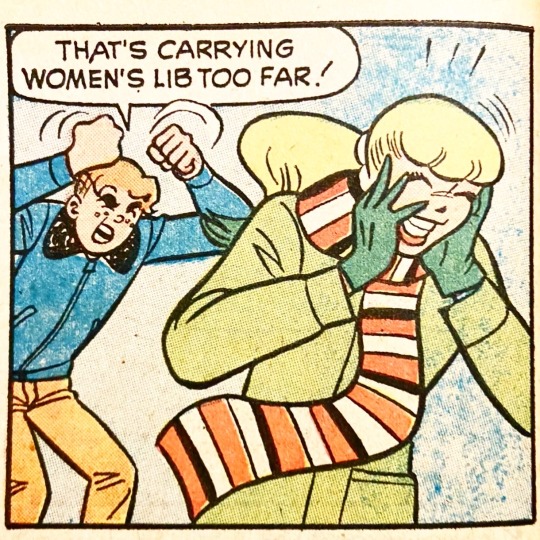

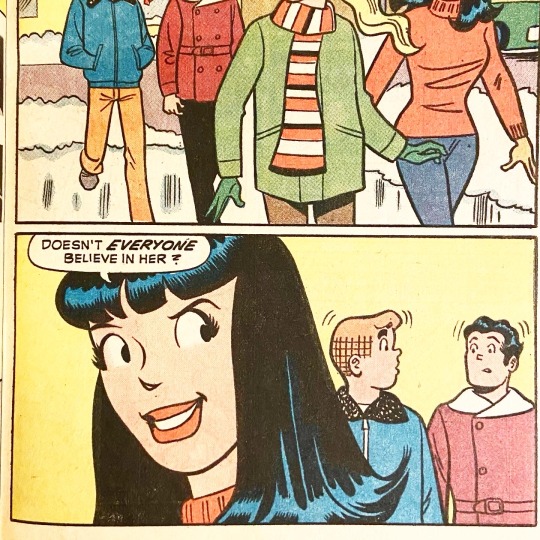
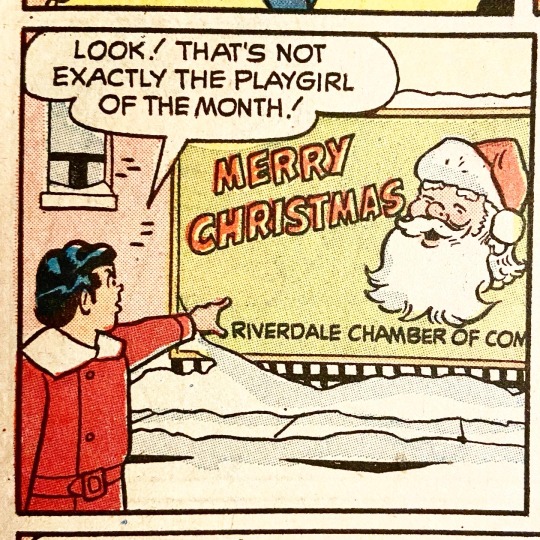
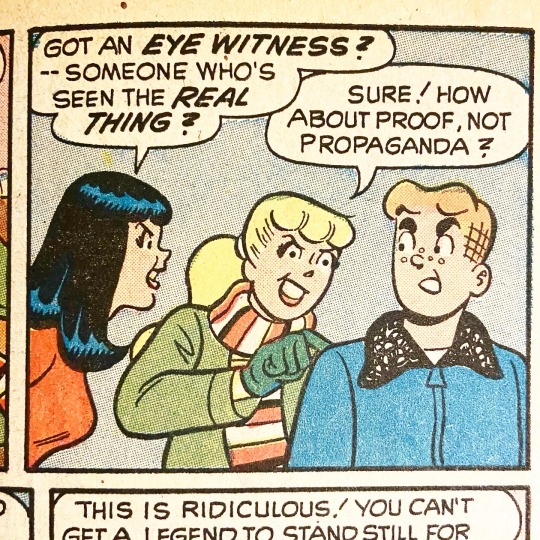
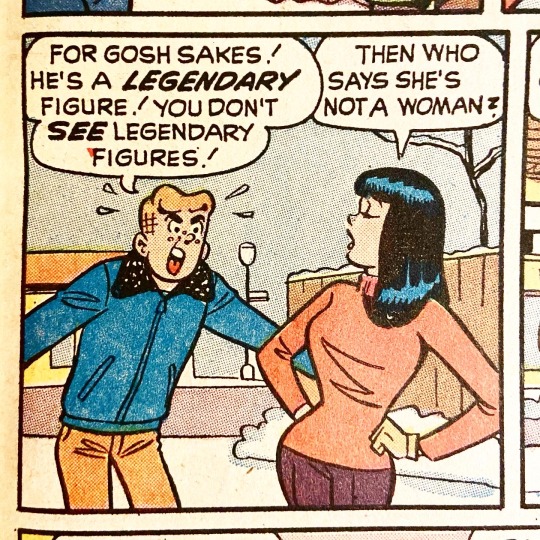



Archie’s X-mas Anxious Masculinity. (Archie Giant Series Magazine, pencils by Harry Lucey, written by Frank Doyle; 1973.)
#Archie#archie comics#harry lucey#betty and veronica#christmas comics#retro comics#classic comics#veronica lodge#betty cooper#archie andrews#reggie mantle#archie probably has a Substack#Archie presents Backlash by Susan Faludi#comics out of context#comics pretty much in context#bedtime comics
1 note
·
View note
